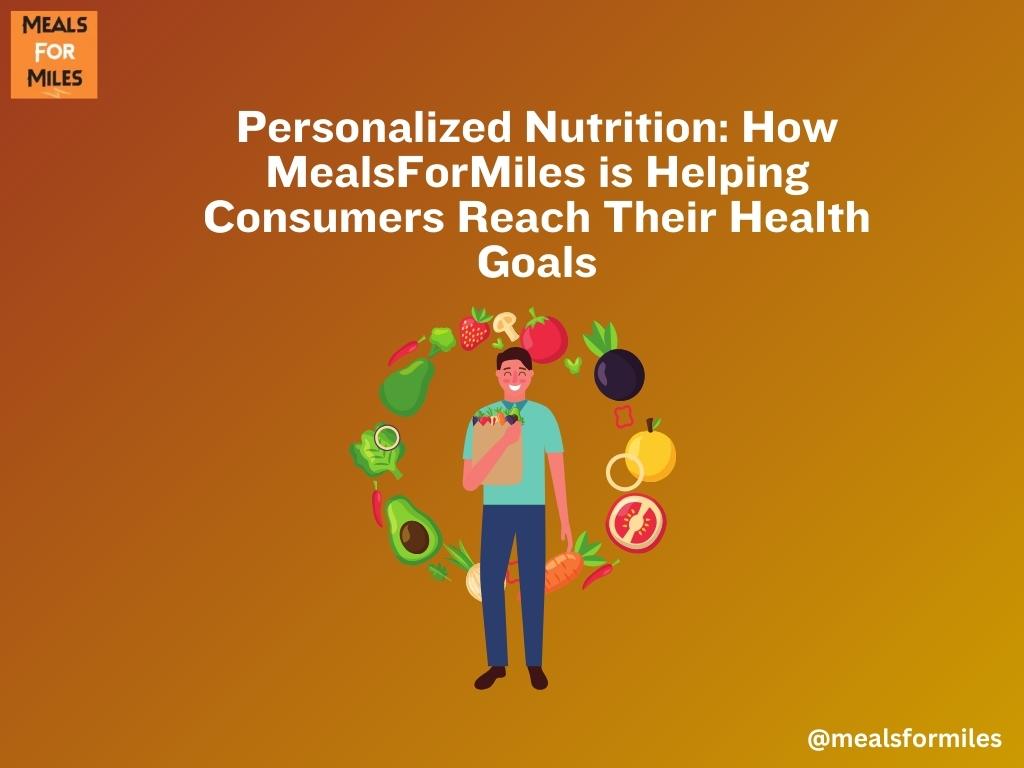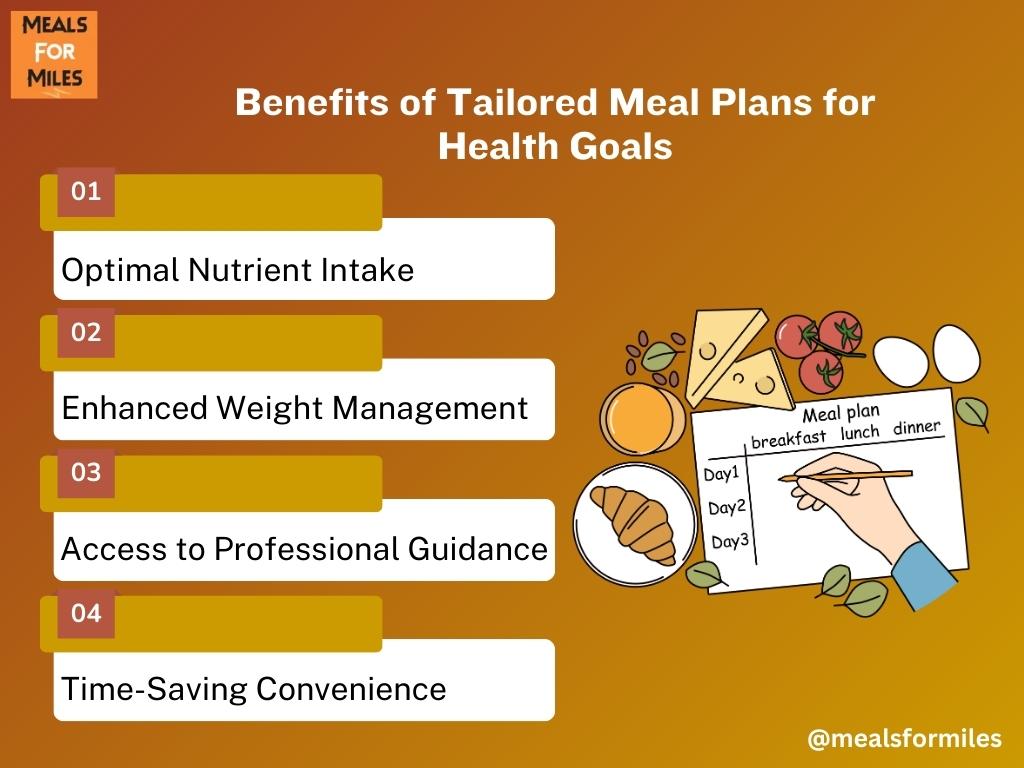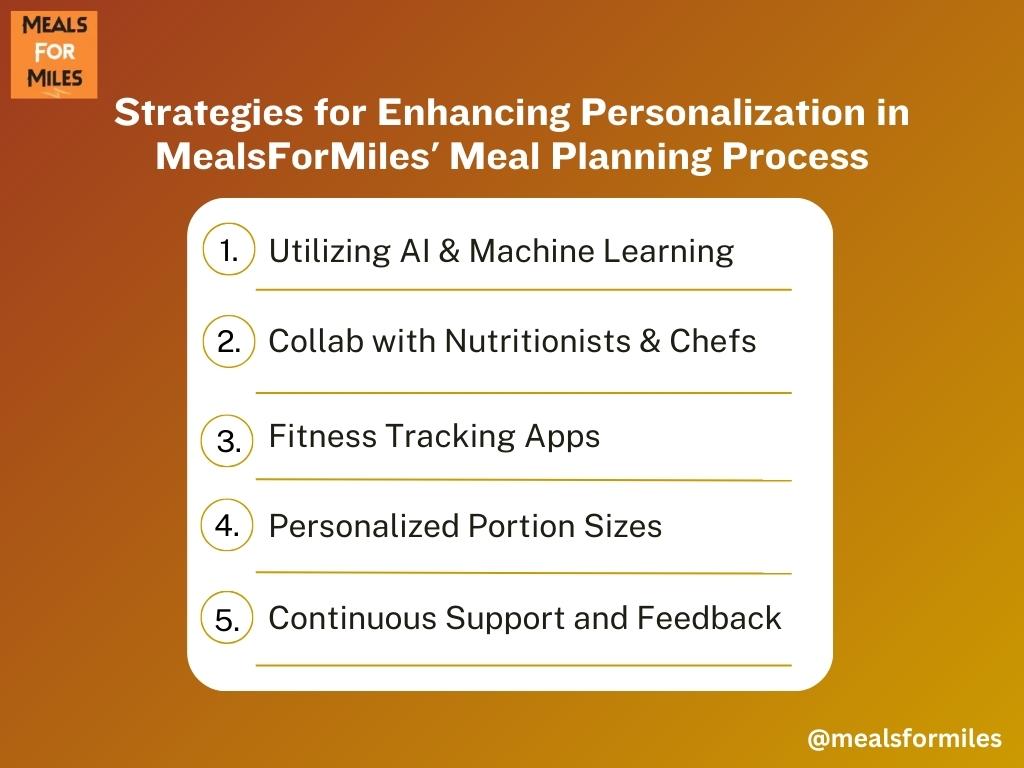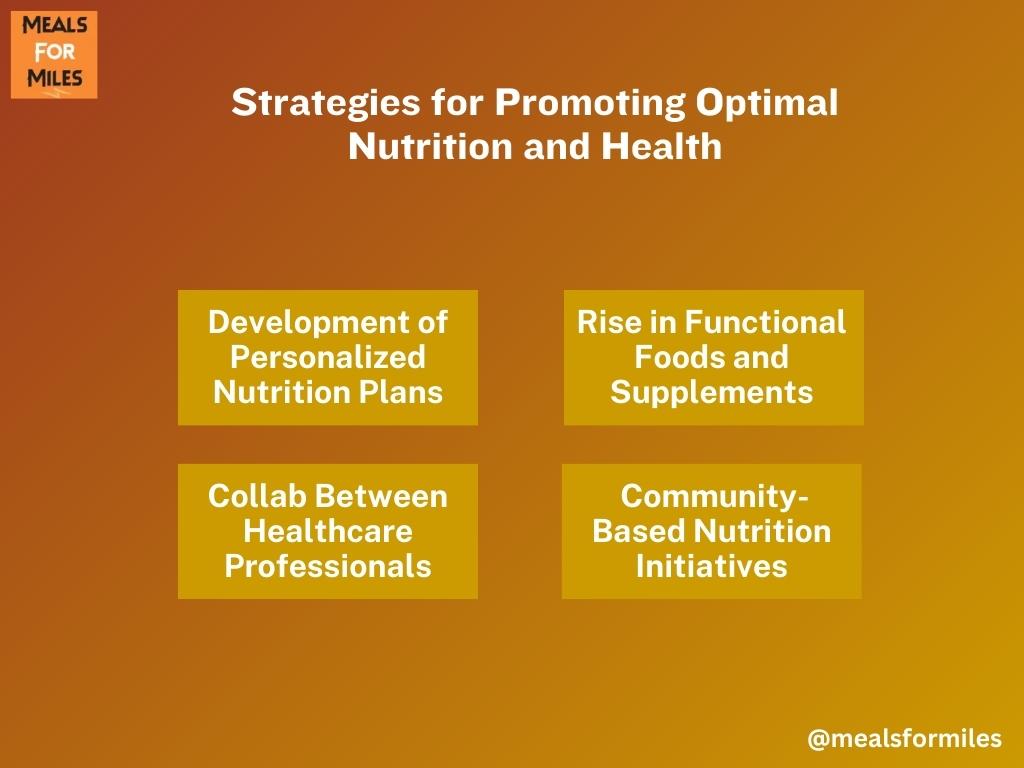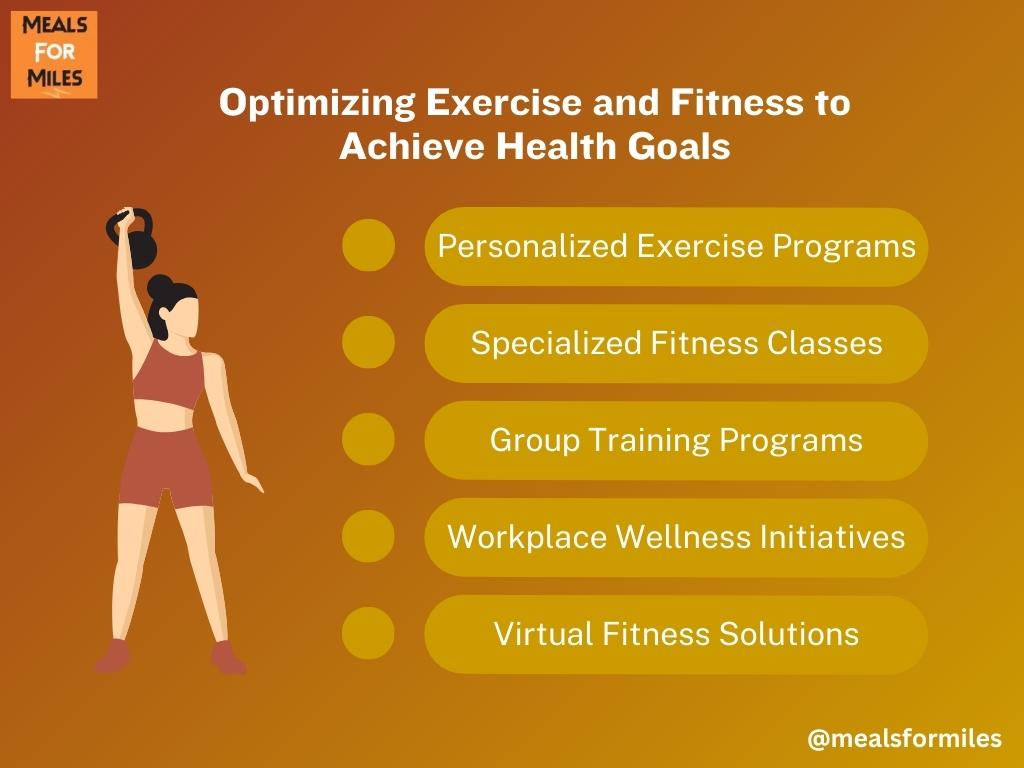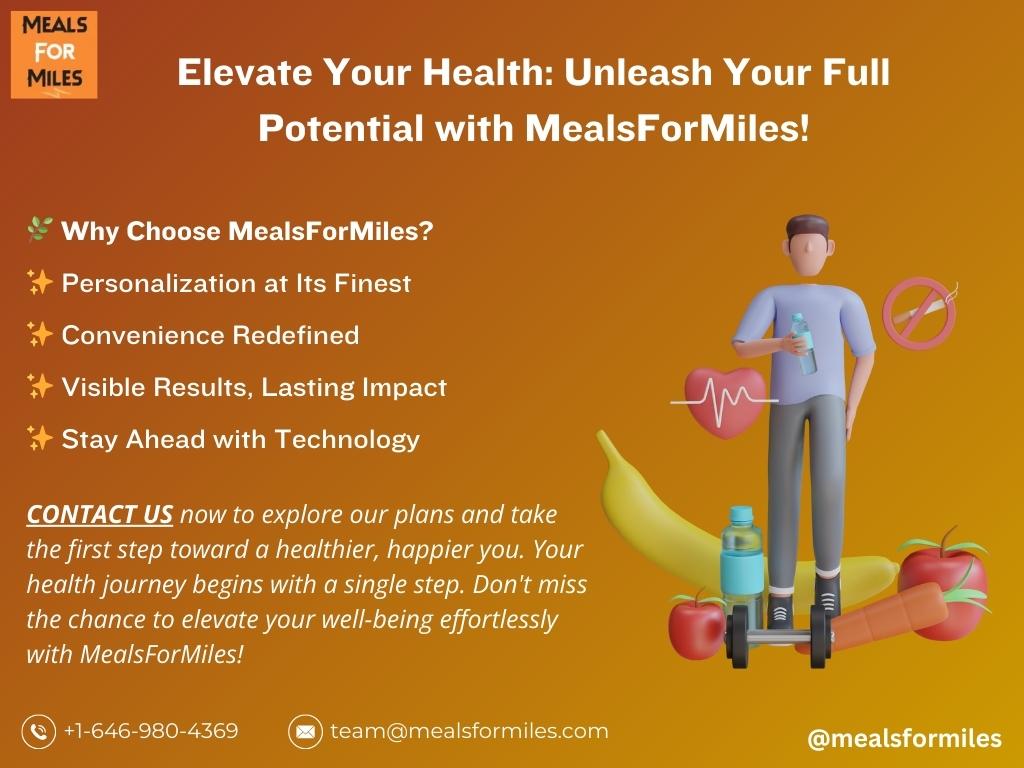Ready to embark on a journey to a healthier, more vibrant you?
Look no further! MealsForMiles is your ultimate partner in personalized nutrition, offering a seamless path to achieving your health and fitness goals.
MealsForMiles is a leading provider of personalized nutrition, offering tailored meal plans for individuals striving to meet health and fitness goals. The company combines convenience with optimal health by delivering nutrient-rich meals directly to customers’ doors. Through a comprehensive questionnaire, customers can specify preferences, dietary restrictions, and fitness objectives, enabling the creation of customized meal plans.
The impact of optimal nutrition on overall health is emphasized, along with the importance of exercise in achieving well-rounded health goals. Additionally, the role of food sensitivity testing is highlighted in addressing individual dietary needs. While acknowledging the challenges of adopting a new nutritional approach, the convenience and benefits of using MealsForMiles are underscored as a valuable investment in the journey toward improved well-being and a healthier, happier life.
Table of Contents
- Introduction to Personalized Nutrition and MealsForMiles
- Benefits of Tailored Meal Plans for Health Goals
- Exploring the Services Offered by MealsForMiles
- How Does MealsForMiles Create Personalized Meal Plans?
- Analyzing the Benefits of a Personalized Nutritional Plan
- The Impact Of Optimal Nutrition On Our Health
- Understanding Food Sensitivity Testing And Its Role In Diet Planning
- Examining The Role Of Exercise In Achieving Our Health Goals
- What Are Some Common Challenges With Adopting A New Nutritional Approach?
- Final Thoughts On Using Meals For Miles To Reach Your Goals
Introduction to Personalized Nutrition and MealsForMiles
Personalized nutrition is a growing trend among health-conscious individuals looking for a way to tailor their lifestyle choices to reach their own individual goals. With pre-made meal plans that can be tailored according to individual needs, MealsForMiles is one of the most popular companies offering this type of service. The company combines personalized nutrition with the convenience of having nutritious meals delivered right to your door. Their mission is to help individuals achieve optimal health while also making it easy and convenient for them.
Benefits of Tailored Meal Plans for Health Goals
The benefits of personalized nutrition are numerous, but perhaps the most important benefit is that it allows consumers to customize their meal plans according to their own individual goals and needs. Whether someone wants to lose weight, gain muscle mass, or just eat healthier overall, they can create a tailored meal plan using MealsForMiles’ services that will ensure they reach those goals in a safe and effective way. By providing users with access to nutrient-rich meals specifically designed for them, MealsForMiles helps consumers take control over their eating habits in order achieve desired results without sacrificing taste or convenience.
- Improved Adherence to Dietary Goals: Tailored meal plans make it easier for individuals to stick to their dietary goals by providing them with meals that are specifically designed to meet their unique needs. This increases the likelihood of long-term success and sustainable lifestyle changes.
- Optimal Nutrient Intake: Personalized nutrition ensures that individuals receive the right balance of macronutrients (carbohydrates, proteins, and fats) and micronutrients (vitamins and minerals) necessary for their specific health goals. This can help prevent nutrient deficiencies and promote overall well-being.
- Enhanced Weight Management: Whether someone wants to lose or gain weight, a tailored meal plan can provide them with the appropriate calorie intake and portion sizes to support their goals. This can help individuals maintain a healthy weight and body composition.
- Improved Athletic Performance: For individuals looking to enhance their athletic performance, a customized meal plan can optimize nutrient timing and composition to support energy levels, muscle recovery, and endurance. This can lead to improved athletic performance and reduced risk of injury.
- Addressing Specific Dietary Restrictions: Tailored meal plans can accommodate various dietary restrictions or preferences, such as vegetarian, vegan, gluten-free, or dairy-free diets. This ensures that individuals can still meet their health goals while adhering to their specific dietary needs.
- Time-Saving Convenience: By providing pre-prepared meals tailored to individual needs, MealsForMiles eliminates the need for individuals to spend time planning, shopping, and cooking meals. This saves time and effort, making it easier for individuals to prioritize their health goals.
- Access to Professional Guidance: MealsForMiles’ personalized meal plans are developed by nutrition experts who have a deep understanding of individual health goals and dietary requirements. This provides users with access to professional guidance and expertise, ensuring they are making informed choices for their health.
- Increased Variety and Taste: Tailored meal plans can provide individuals with a wide range of delicious and nutritious meal options that they may not have considered before. This increases variety in their diet and prevents boredom, making it easier to stick to the plan long-term.
- Health Education and Awareness: Through personalized meal plans, MealsForMiles can educate individuals about the importance of nutrition and its impact on their health. This can help increase awareness and empower individuals to make healthier choices beyond the meal plan.
- Monitoring and Accountability: Personalized meal plans often come with tracking tools and regular check-ins to monitor progress and provide accountability. This can help individuals stay on track with their health goals and make necessary adjustments as needed.
Exploring the Services Offered by MealsForMiles
MealsForMiles offers a variety of services designed specifically with each customer’s dietary needs in mind. From creating custom meal plans based on body type and activity level, tracking calories consumed throughout the day through an app called MyFitnessPal (which links directly into the website), as well as providing online coaching sessions from certified dieticians who can answer any questions related to nutrition you may have – all these features make it easier than ever before for anyone looking into pursuing healthier eating habits or reaching specific fitness goals like weight loss or muscle building. Furthermore, customers have access switch up meal plans at any time if they decide one isn’t working out for them – giving users complete control over how much they spend on food each month depending on how flexible their budget might be while still receiving quality meals every week.
Here are the 10 Strategies for Enhancing MealsForMiles’ Services and Market Presence:
- Expansion of Menu Options: MealsForMiles can consider expanding their menu options to cater to a wider range of dietary needs and preferences. This can include options for vegetarian, vegan, gluten-free, and dairy-free meals, ensuring they are able to serve a diverse customer base.
- Partnerships with Fitness Influencers: Collaborate with fitness influencers and experts to create specialized meal plans and promote their services. This can help attract customers who look up to these influencers as role models for healthy eating and fitness.
- Integration with Wearable Fitness Devices: Explore partnerships or integrations with popular fitness tracking devices like Fitbit or Apple Watch. By syncing the data from these devices with the MyFitnessPal app, customers can have a more accurate analysis of their calorie consumption and activity levels, allowing MealsForMiles to provide even more personalized meal plans.
- Corporate Wellness Programs: Target corporate clients by offering customized meal plans and nutrition education for their employees. This can be a great way to promote healthy eating habits in the workplace, leading to increased productivity and employee satisfaction.
- Collaboration with Local Gyms and Fitness Centers: Partner with local gyms and fitness centers to offer exclusive discounts or promotions to their members. This can create a mutually beneficial relationship, where MealsForMiles can attract new customers while the gyms can provide added value to their members.
- Specialized Meal Plans for Athletes: Develop specialized meal plans tailored towards athletes and individuals involved in intense training. These plans can focus on macronutrient ratios, specific nutrient timing, and recovery meals to help optimize performance and support muscle growth.
- Community Engagement and Support: Provide additional resources such as online forums or social media groups where customers can connect and support each other on their health and fitness journeys. This sense of community can help customers stay motivated and accountable to their goals.
- Collaboration with Healthcare Professionals: Partner with healthcare professionals, such as doctors or registered dietitians, to create medically supervised meal plans for individuals with specific health conditions or dietary restrictions. This can help position the company as a trusted and reliable source for nutrition advice.
- Expansion into Retail: Explore the possibility of offering pre-made meals in retail stores or partnering with grocery stores to carry their products. This can provide convenience to customers who may not want to commit to a subscription service but still want healthy meal options.
- Customizable Portion Sizes: Offering customizable portion sizes can cater to customers with varying appetites or dietary goals. This can be particularly appealing for individuals who are trying to manage their calorie intake or are following specific portion control guidelines.
Overall, MealsForMiles has the potential to continue growing by expanding their services, collaborating with relevant partners, and staying on top of emerging trends in the health and fitness industry.
How Does MealsForMiles Create Personalized Meal Plans?
MealsForMiles creates personalized meal plans by starting with an extensive questionnaire that asks about customers’ food preferences, allergies, dietary restrictions, activity level, and fitness goals. Based on this information, customers receive tailored recipes that consider calorie intake and macronutrient composition. Customers can then make adjustments online, such as ingredient substitutions, to fit their preferences and guidelines. Once everything is finalized, MealsForMiles sends all the required ingredients and instructions, making the process convenient and time-saving.
Here are the 10 Innovative Strategies for Enhancing Personalization in MealsForMiles’ Meal Planning Process:
- Utilizing AI and Machine Learning: Incorporate artificial intelligence and machine learning algorithms to analyze the questionnaire responses and customer data to generate personalized meal plans. These algorithms can learn from patterns and trends to continuously improve the recommendations over time.
- Collaborating with Nutritionists and Chefs: Collaborate with nutritionists and chefs to develop a comprehensive database of recipes that meet various dietary requirements. These experts can ensure that the meal plans are not only personalized but also nutritionally balanced and appealing in taste.
- Integration with Fitness Tracking Apps: Integrate with popular fitness tracking apps to gather data on customers’ activity levels, exercise routines, and calorie burn. This information can be used to fine-tune the meal plans, ensuring they align with customers’ fitness goals and energy expenditure.
- Food Sensitivity and Allergy Management: Expand the questionnaire to include specific questions about food sensitivities and allergies. This information can be used to develop meal plans that exclude or substitute ingredients that customers cannot consume, ensuring their safety and avoiding any adverse reactions.
- Personalized Portion Sizes: Offer portion customization options based on customers’ calorie requirements and appetite. This feature would allow users to adjust the serving sizes to meet their unique needs, promoting portion control and preventing overeating.
- Recipe Suggestions and Variations: Provide recipe suggestions and variations based on customers’ preferences to keep the meal plans exciting and diverse. This could include options for vegetarian, vegan, gluten-free, or other specific dietary preferences, catering to a wide range of customers.
- Continuous Support and Feedback: Offer ongoing support and feedback to customers through a personalized dashboard or mobile app. This platform can provide nutritional insights, track progress, and offer recommendations for improvement, motivating customers to stay on track with their goals.
- Customized Grocery Lists: Generate customized grocery lists based on the selected recipes and portion sizes. This feature would save customers time by eliminating the need to manually compile shopping lists.
- Integration with Meal Prep Services: Partner with meal prep services to offer ready-to-cook or pre-prepared meals based on the personalized meal plans. This collaboration would provide customers with convenience while still allowing them to enjoy the benefits of a tailored nutrition plan.
- Community and Social Features: Create an online community where customers can connect with others who have similar goals, share recipes, and provide support. This social aspect would foster a sense of camaraderie and keep customers engaged in their health journey.
Analyzing the Benefits of a Personalized Nutritional Plan
Personalizing a nutritional plan offers several benefits. It allows individuals to tailor their diet to specific health objectives, such as weight loss or muscle building. It also helps people discover which foods work best within certain dietary restrictions, like gluten-free diets. By knowing the ingredients in each recipe, individuals gain insight into the nutrients they are consuming. This flexibility in selecting dishes within budgetary constraints ensures adequate amounts of vitamins and minerals for peak performance during physical activities. Customizing recipes based on personal tastes ensures enjoyment and prevents boredom, which can lead to a lack of motivation and abandonment of dietary efforts.
Here are the 10 he Comprehensive Benefits of Personalized Nutritional Plans for Health and Well-being:
- Improved Health Outcomes: A personalized nutritional plan takes into account an individual’s specific health objectives, whether it be weight loss, muscle building, or managing a chronic condition. By tailoring the diet to meet these objectives, individuals can optimize their health and achieve better outcomes.
- Enhanced Compliance: By incorporating foods that work within certain dietary restrictions, such as gluten-free diets, a personalized nutritional plan ensures individuals can adhere to their dietary requirements. This increases compliance and reduces the risk of accidentally consuming foods that may negatively impact their health.
- Nutrient Awareness: Understanding the ingredients in each recipe allows individuals to gain insight into the nutrients they are consuming. This knowledge empowers them to make informed choices about their diet and ensure they are meeting their nutritional needs. It also helps identify any deficiencies that can be addressed through targeted supplementation.
- Peak Performance: Customizing recipes within budgetary constraints ensures individuals receive adequate amounts of vitamins and minerals necessary for optimal performance during physical activities. Whether it’s a professional athlete or someone engaging in regular exercise, a personalized nutritional plan can provide the necessary fuel to perform at their best.
- Enjoyment and Motivation: Personalizing recipes based on personal tastes ensures individuals can enjoy their meals and prevent boredom. This is crucial for long-term adherence to a nutritional plan, as lack of enjoyment can lead to a loss of motivation and abandonment of dietary efforts. By incorporating foods individuals enjoy, they are more likely to stick to their plan and achieve their health goals.
- Long-Term Sustainability: A personalized nutritional plan takes into account an individual’s lifestyle, preferences, and goals, making it more sustainable in the long run. By creating a plan that aligns with their unique needs, individuals are more likely to continue following it, leading to lasting health improvements.
- Better Overall Well-being: When individuals have control over their nutritional plan, they often experience a sense of empowerment and improved overall well-being. Knowing that they are taking charge of their health and making choices that align with their goals can have a positive impact on their mental and emotional state.
- Prevention and Management of Chronic Conditions: Personalized nutritional plans can be designed to address specific chronic conditions, such as diabetes, heart disease, or hypertension. By tailoring the diet to manage these conditions, individuals can improve their health outcomes, reduce the need for medication, and potentially prevent future complications.
- Education and Awareness: Working with a personalized nutritional plan provides individuals with the opportunity to learn about proper nutrition, portion control, and the impact of different foods on their health. This education empowers them to make better choices even outside of the structured plan, promoting a lifelong healthy eating habit.
- Individualized Support: A personalized nutritional plan often comes with the support of a nutritionist or dietitian who can provide guidance, answer questions, and make adjustments as needed. This professional support ensures that individuals have the necessary resources and expertise to successfully implement and maintain their personalized plan.
The Impact Of Optimal Nutrition On Our Health
Optimal nutrition is crucial for physical fitness and overall health. It provides the necessary fuel for our bodies to function efficiently and prevents us from feeling drained. Eating a balanced diet ensures we consume enough vitamins and minerals to repair cells and aid digestion, reducing the risk of obesity and diabetes. A well-planned diet can also prevent common diseases and promote longevity.
Here are the 10 Strategies for Promoting Optimal Nutrition and Health:
- Development of Personalized Nutrition Plans: With the growing understanding of individual differences in nutrient needs and genetic variations, nutrition experts can help develop personalized nutrition plans tailored to each person’s unique requirements. This could involve genetic testing, analysis of lifestyle factors, and the creation of customized meal plans to optimize health outcomes.
- Rise in Functional Foods and Supplements: As people become more aware of the impact of nutrition on health, there will be an increased demand for functional foods and supplements. These products will be specifically formulated to provide targeted nutrients that support various aspects of health, such as immune function, gut health, cognitive function, and athletic performance. The industry will see advancements in the development of these specialized products.
- Integration of Technology in Nutrition Counseling: Technology will play a significant role in optimizing nutrition counseling and support. Nutrition experts will utilize various tools such as mobile apps, wearable devices, and online platforms to track and analyze individuals’ dietary intake, physical activity, and health metrics. This technology-driven approach will allow for real-time monitoring, feedback, and personalized recommendations, enhancing the effectiveness of nutrition interventions.
- Collaboration Between Healthcare Professionals: Optimal nutrition is an integral part of preventive healthcare. As a result, there will be an increased collaboration between healthcare professionals, including doctors, nutritionists, dietitians, and fitness trainers. This interdisciplinary approach will ensure comprehensive guidance and support for individuals in achieving optimal nutrition and overall health.
- Focus on Workplace Wellness Programs: Employers will realize the importance of optimal nutrition in improving employee productivity, reducing healthcare costs, and enhancing overall workplace wellness. As a result, workplace wellness programs will increasingly include nutrition education, healthy food options, and initiatives to encourage healthy eating habits. Nutrition experts will play a vital role in designing and implementing these programs.
- Growth of the Organic and Sustainable Food Industry: With the awareness of the impact of nutrition on health, there will be a surge in demand for organic and sustainably produced food. Nutrition experts will educate consumers about the benefits of choosing organic options and help them make informed decisions about food sourcing. This will lead to the growth of the organic and sustainable food industry, creating new opportunities for farmers, food producers, and retailers.
- Increased Focus on Nutrition Education in Schools: Recognizing the long-term impact of nutrition on health, schools will prioritize nutrition education as part of their curriculum. Nutrition experts will work closely with educational institutions to develop age-appropriate nutrition programs, teach healthy eating habits, and empower children to make informed food choices from an early age. This will contribute to a healthier future generation.
- Expansion of Nutrition Research and Evidence-Based Practices: As the understanding of nutrition and its impact on health continues to evolve, there will be an expansion of research in this field. Nutrition experts will contribute to the development of evidence-based practices through conducting studies, analyzing data, and disseminating scientific knowledge. This will further enhance the credibility and effectiveness of nutrition interventions.
- Integration of Nutrition Into Healthcare Systems: Nutrition will be recognized as a crucial component of healthcare systems, leading to its integration into primary care settings. Nutrition experts will work alongside healthcare professionals to provide dietary counseling, monitor nutrition-related health indicators, and address nutrition-related issues as part of routine healthcare services. This integration will improve patient outcomes and reduce the burden of chronic diseases.
- Emphasis on Community-Based Nutrition Initiatives: To promote optimal nutrition at a population level, nutrition experts will initiate and participate in community-based nutrition initiatives. These initiatives may include nutrition education programs, cooking classes, community gardens, and collaborations with local organizations to increase access to healthy food options. By addressing nutrition at the community level, there will be a broader impact on improving overall health and well-being.
Understanding Food Sensitivity Testing And Its Role In Diet Planning
Food sensitivity testing is important for creating personalized nutrition plans because it helps identify which foods cause adverse reactions. The testing involves analyzing blood samples for antibodies in response to recently consumed foods. This allows individuals with intolerances to determine if adding more of a certain food will worsen symptoms. Having this knowledge ahead of time can prevent unnecessary stress and help individuals stick to a strict dietary regimen.
Here are the 10 Strategies for Advancing Food Sensitivity Testing and Enhancing its Role in Personalized Diet Planning:
- Developing Advanced Food Sensitivity Testing Methods: Focus on researching and developing more accurate and efficient food sensitivity testing methods. This could involve exploring new technologies such as DNA-based testing or using artificial intelligence algorithms to analyze blood samples more effectively.
- Creating Comprehensive Food Sensitivity Databases: Establish comprehensive databases that catalog different food sensitivities and their corresponding symptoms. This would help both individuals and nutrition professionals easily identify potential triggers and design personalized nutrition plans accordingly.
- Integrating Food Sensitivity Testing Into Diet Planning Apps: Collaborate with app developers to integrate food sensitivity testing capabilities into existing diet planning applications. This would allow users to track their symptoms, record their food intake, and receive real-time recommendations based on their test results.
- Educating Healthcare Professionals on Food Sensitivity Testing: Organize educational workshops or webinars to bridge the knowledge gap among healthcare professionals regarding the benefits and limitations of food sensitivity testing. This ensures that more professionals are equipped to guide individuals in their dietary planning.
- Conducting Research to Validate the Efficacy of Food Sensitivity Testing: Collaborate with universities and research institutions to conduct studies that assess the impact of personalized nutrition plans based on food sensitivity testing results. This research is essential to validate the effectiveness of such testing.
- Collaborating with Food Manufacturers and Retailers: Work closely with food manufacturers and retailers to develop specialized food products and menus that cater to individuals with specific food sensitivities. This collaboration could involve creating dedicated sections in grocery stores or partnering with restaurants to offer allergy-friendly options.
- Providing Ongoing Support and Resources: Establish support networks and online communities for individuals with food sensitivities. These platforms could provide resources, recipes, and a space for people to share their experiences and advice on managing their specific dietary needs.
- Exploring the Link Between Food Sensitivities and Other Health Conditions: Conduct research on the potential relationship between food sensitivities and other health conditions, such as autoimmune diseases or gastrointestinal disorders. This could lead to a better understanding of the underlying mechanisms and help identify more effective dietary interventions.
- Collaborating with Insurance Companies: Collaborate with insurance companies to include coverage for food sensitivity testing. This would make these tests more accessible and affordable, enabling a wider range of individuals to benefit from personalized nutrition plans based on their specific sensitivities.
- Conducting Studies on Long-term Outcomes: Conduct longitudinal studies that track individuals’ health, adherence to their dietary plans, and overall quality of life over an extended period. This would provide valuable insights into the effectiveness and sustainability of personalized nutrition plans based on food sensitivity testing.
Examining The Role Of Exercise In Achieving Our Health Goals
Exercise plays a crucial role in achieving optimal health. While diet is often emphasized, exercise is equally important in achieving desired results. Exercise helps burn calories, reduce fat, increase strength and endurance, and maintain a healthy heart rate. It also has mental and emotional benefits, such as improving clarity, mood, reducing stress, and promoting better sleep. It is important to note that everyone’s needs are different, and a personalized exercise routine is necessary. With careful planning and adjustments, progress can be seen over time, leading to positive outcomes.
Here are the 7 Strategies for Optimizing Exercise and Fitness to Achieve Health Goals:
- Personalized Exercise Programs: Fitness professionals should work closely with individuals to develop personalized exercise plans based on their specific goals, fitness levels, and any existing health conditions. This approach ensures that exercise routines are tailored to meet individual needs, leading to better results.
- Specialized Fitness Classes: Offering a wide variety of fitness classes can help cater to different preferences and goals. For example, high-intensity interval training (HIIT) classes can be beneficial for weight loss and cardiovascular health, while yoga or Pilates classes can improve flexibility, balance, and core strength. By diversifying class offerings, fitness centers can attract a broader range of individuals and cater to their specific health goals.
- Incorporating Technology: Utilizing fitness tracking devices, mobile apps, and online platforms can help individuals track their progress, set goals, and stay motivated. These technologies can provide real-time feedback, personalized workout suggestions, and social support, enhancing adherence to exercise routines.
- Group Training Programs: Encouraging group exercise sessions can foster a sense of community and accountability. Group training programs, such as boot camps or team sports, can not only provide a social aspect to exercise but also offer the benefits of friendly competition and motivation from others.
- Workplace Wellness Initiatives: Many companies now recognize the importance of promoting employee health and well-being. Implementing workplace wellness programs that include exercise classes, gym memberships, or even walking meetings can help employees incorporate physical activity into their daily routines, leading to improved overall health and productivity.
- Virtual Fitness Solutions: With the rise of on-demand workouts and virtual fitness platforms, individuals can access exercise routines and classes from the comfort of their homes. Virtual fitness solutions can provide convenience, flexibility, and cost-effectiveness, particularly for those with time constraints or limited access to fitness facilities.
- Integrating Exercise into Daily Life: Encouraging individuals to incorporate physical activity into their daily routines can lead to a more active lifestyle. Simple changes like taking the stairs instead of the elevator, walking or biking to work, or scheduling regular breaks for stretching and light exercises can all contribute to achieving health goals.
What Are Some Common Challenges With Adopting A New Nutritional Approach?
Adopting a new nutritional approach can be challenging due to various factors. These challenges include adjusting to different flavors in meals, dealing with cravings for unhealthy snacks, and missing familiar indulgences. It is also important to learn proper portion sizes and resist overeating. Additionally, replacing processed foods with natural options is necessary to avoid artificial additives. Overcoming these obstacles requires dedication, commitment, and patience, as change takes time and practice. It is crucial to remain consistent and put effort into the journey to achieve long-term success and enjoy the benefits that come with it.
Here are the 10 Common Challenges in Embracing a New Nutritional Approach and Strategies to Overcome Them:
- Resistance to Change: Many people are resistant to change, especially when it comes to their eating habits. They may be comfortable with their current diet and find it difficult to adapt to a new nutritional approach.
- Lack of Knowledge and Information: Adopting a new nutritional approach requires understanding the principles and guidelines of the approach. Lack of knowledge about the nutritional value of foods and how to properly balance meals can pose a challenge.
- Social Pressure and Influence: Eating habits are often influenced by social settings and peer pressure. Adopting a new nutritional approach may mean deviating from the norm in social situations, which can be challenging for some individuals.
- Emotional Attachment to Food: Many people have emotional attachments to certain foods or find comfort in indulging in unhealthy snacks. Overcoming these emotional attachments and finding healthier alternatives can be a challenge.
- Time Constraints: Preparing nutritious meals often requires time and effort. People with busy schedules may find it challenging to prioritize meal planning, grocery shopping, and cooking, which can hinder the adoption of a new nutritional approach.
- Financial Limitations: Some individuals may find it challenging to afford healthier options and ingredients. Eating a nutritious diet can sometimes be more expensive than relying on processed or unhealthy foods.
- Lack of Support or Accountability: Making a significant dietary change can be easier with the support of others who are also committed to a similar approach. Lack of support or accountability can make it challenging to stick to a new nutritional approach.
- Taste Preferences: Different nutritional approaches may require adjusting to new flavors and taste profiles. Some individuals may find it challenging to enjoy or appreciate the taste of certain foods, making it difficult to adopt a new nutritional approach.
- Lack of Variety: Sticking to a specific nutritional approach may limit food options and variety, making it challenging to maintain interest and motivation in the long run.
- Unrealistic Expectations: Some individuals may have unrealistic expectations about the quick results or benefits that come with adopting a new nutritional approach. When these expectations are not met, it can be discouraging and lead to a lack of motivation to continue.
Final Thoughts On Using Meals For Miles To Reach Your Goals
Using Meals For Miles’ service to reach personalized health goals is a great option for those seeking to achieve desired outcomes easily and quickly without compromising flavor, quality, and convenience. Combining expert advice from certified dieticians alongside pre-planned menus tailor-made to your requirements and carefully selected ingredients prepped and ready to cook, delivered straight to your door, leaves little room for error, ensuring maximum chances of success with minimal effort required to accomplish the mission at hand.
By taking away the headache of grocery store trips and removing the guesswork, creating customized solutions that perfect fit lifestyles, everybody wins, and the end result far outweighs the price tag attached, making it a worthwhile investment in the beginning of the journey towards improved wellbeing and ultimately a happier life!
Your health journey begins with a single step. Don’t miss the chance to elevate your well-being effortlessly with MealsForMiles.
Contact us now to explore our plans and take the first step toward a healthier, happier you!

